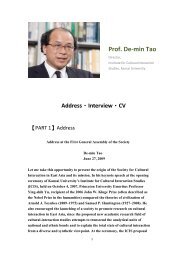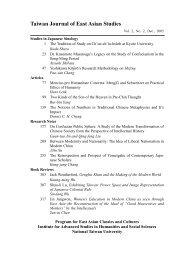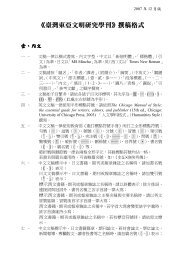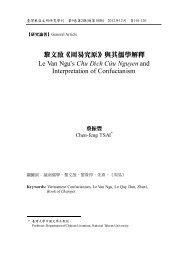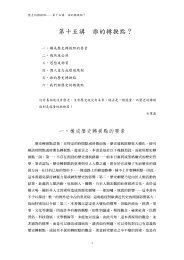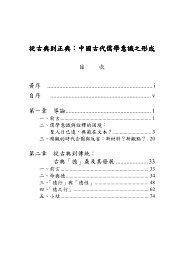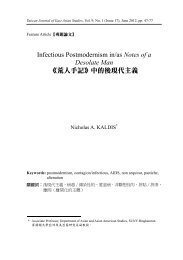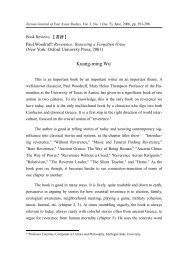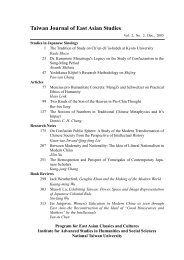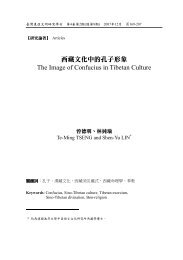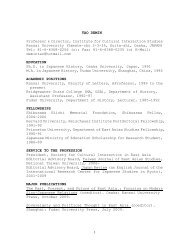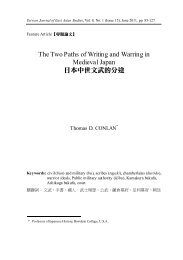臺灣東亞文明研究學刊 - 東亞經典與文化研究計畫 - 國立臺灣大學
臺灣東亞文明研究學刊 - 東亞經典與文化研究計畫 - 國立臺灣大學
臺灣東亞文明研究學刊 - 東亞經典與文化研究計畫 - 國立臺灣大學
You also want an ePaper? Increase the reach of your titles
YUMPU automatically turns print PDFs into web optimized ePapers that Google loves.
Jeng-Guo CHEN Scottish Discussions of Indian Effeminacy in the Eighteenth Century 161<br />
Scots soldier and historian of Persia and India John Malcolme observed that<br />
Hinduism was "calculated to preserve a vast community in tranquility and<br />
obedience to its rulers." 23 He firmly believed that Britain had to protect its subjects,<br />
the majority of which were Hindus, against the warlike Muslims. In wars of "selfpreservation,"<br />
such as the much publicized war against Tippo Sultan, the British<br />
defended the effeminate and defenseless Hindus against the threat of virile and<br />
vigorous Muslims. 24<br />
Little attention was paid to Ferguson's emphasis on the primacy of national<br />
vitality until James Mill published his unorthodox views on imperialism. Mill<br />
admired Muslim civilization and despised Hinduism, finding in the national<br />
character and cultural performance of the Muslims the qualities that corresponded<br />
to strong minds and bodies in his Fergusonian theory of the advancement of<br />
civilization. 25 Mill flouted common opinion about South Asian societies, which<br />
originally derived from mercantilist propaganda. According to the mercantilist line,<br />
Hindu nations were more civilized and sophisticated than their conquerors, the<br />
Muslims. In addition to the perceived mildness of Hindu religious doctrines and<br />
social practices, Western explorers generally agreed that the indigenous inhabitants<br />
of India, the Hindustanis, had accumulated their tremendous wealth thanks to great<br />
skill in commerce. But in his History of British India (1818), Mill boldly refuted<br />
this truism, arguing that the Muslim nation was more vigorous than the Hindu in<br />
both mind and body. He contrasted the "extravagance" and inaccuracy of Hindu<br />
chronology with the great care taken in Muslim historiography. 26 Mental habits<br />
23 Quoted in Martha McLaren, British India and British Scotland, 1780-1830 (Akron: University of<br />
Akron Press, 2001), p. 150.<br />
24 John Malcolm, Sketch of the Political History in India (London, 1811), p. 4.<br />
25 Duncan Forbes labeled Ferguson's ideas "vitalism." A recent study of Adam Smith highlights the<br />
correspondences between his economic theory and the contemporaneous physiological studies of<br />
vitalism so enthusiastically discussed in Edinburgh from the1730s to the 1750s. More work needs<br />
to be done in this area. See Catherine Packham, "The Physiology of Political Economy: Vitalism<br />
and Adam Smith's 'Wealth of Nations,'" Journal of the History of Ideas, 63, 3 (2002), pp. 465-481.<br />
26 The equation of historiographical accomplishment and mental advancement was first made by<br />
William Robertson in his The History of Scotland: During the Reigns of Queen Mary and King<br />
James VI, till His Accession to the Crown of England (London: 1759).<br />
xiii



